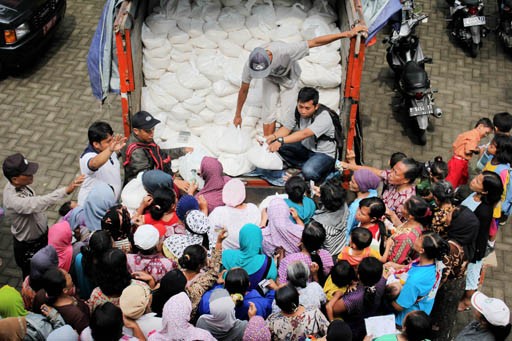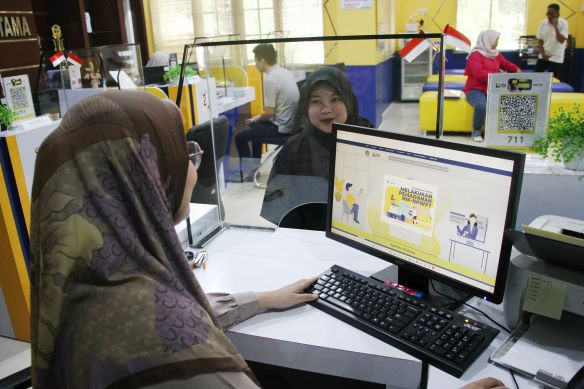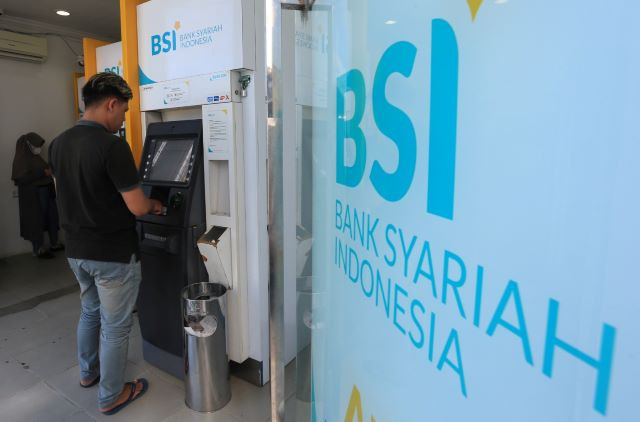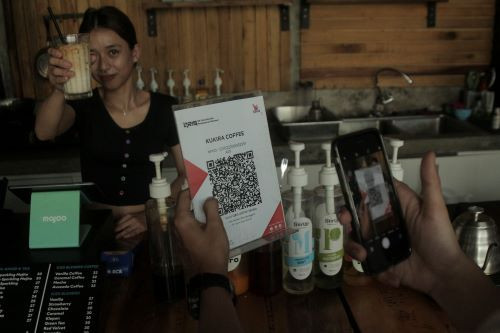How regions can enhance nutrition and food security
The State Logistics Agency (BULOG), the national agency responsible for food distribution and price control, seems to be struggling to fill rice stocks for the Indonesians who are high rice-dependent consumers and to support maximum food consumer prices in the market. A recent Organisation for Economic Co-operation and Development (OECD) study found that the domestic price of rice increased to 60 percent greater than its international prices in the period from 2010 to 2012.
Change Size
 People purchase rice during a market intervention in Bulak Banteng subdistrict, Surabaya, East Java, in a March 10 2015 file photo. The State Logistics Agency (Bulog) organized the event. (Antara/Bima)
People purchase rice during a market intervention in Bulak Banteng subdistrict, Surabaya, East Java, in a March 10 2015 file photo. The State Logistics Agency (Bulog) organized the event. (Antara/Bima)
I
ndonesia has institutionalized the human right to adequate food for all its residents under Food Law No. 18/2012. Some policies for enhancing access to sufficient, safe and nutritionally balanced food have been developed.
The law has been implemented by increasing domestic food productivity, by establishing governance structures that link relevant institutions and by empowering local communities.
How successful has the policy been since nutrition and food security were declared priorities for the country more than three decades ago?
On the supply side, under pressure of agricultural land degradation, natural disaster shocks and a high population growth rate, the government aims at increasing food production. It subsidizes fertilizer and seeds for producers. The subsidies in 2015 amounted to Rp 35.7 trillion (US$2.75 billion) for fertilizers and Rp 900 billion for seeds, which amounts to about 17 percent of the total production costs.
Along with this subsidy policy, the government also encourages new technologies and tries to improve extension performance. Yet, the imports of rice and other staples by the government are also increasing from 500,000 to 3 million tons annually.
Also, to increase food accessibility, the policy aims at stabilizing food market prices and implementing the “rice for poor people” policy. The State Logistics Agency (BULOG), the national agency responsible for food distribution and price control, seems to be struggling to fill rice stocks for the Indonesians who are high rice-dependent consumers and to support maximum food consumer prices in the market.
A recent Organisation for Economic Co-operation and Development (OECD) study found that the domestic price of rice increased to 60 percent greater than its international prices in the period from 2010 to 2012.
Despite the manifold political initiatives, Indonesia still faces a substantial food security problem. It has made little progress in reducing food insecurity and has particularly performed poorly in increasing adequate access to food for all its citizens.
Compared to other ASEAN members, Indonesia has a low global food security index.
According to The Economist Intelligence Unit, in 2015 the score was 46.7 on a range of zero to 100 where 100 is the most favorable. The Food and Agriculture Organization of the UN (FAO) reported that in the period from 2012 to 2014 about 21.6 million Indonesians were undernourished — that is, about 8.5 percent of the total population.
In summary, Indonesia should diversify its policy scenarios to reduce food insecurity, rather than focusing policy attention on domestic production of staple foods. The involvement of the governments at provincial and regional levels in enhancing food security may develop a broad spectrum of policies.
For improving food security, the central government could allow local authorities to take responsibility for increasing food productivity and for restructuring food supply chains and distribution. This responsibility is reliant upon technical ability and financial constraints.
Decentralized food supply management may be advantageous to promote successful governance for building local resilience in food issues. Of course, the central government should be able to control regional authorities on such a food security scheme along with BULOG’s tasks. Is the BULOG able to deal with the food insecurity issue?
Indeed, the national logistic network today seems inefficient to control food availability and affordability. Its costs are still high, about 25 percent of total gross domestic product (GDP), or about 14 percent of total food production. Such inefficiencies are caused by the poor infrastructure that results in high transportation costs because of the long distances between producers and consumers. With stronger regional authorities, the regional governments could cooperate in establishing local food reserves that are close to consumers since the food is a perishable commodity. Such an integrated network would be successful for the accessibility of locally produced food.
This local participation is more beneficial because of the regional heterogeneity of Indonesia. Every region has unique cultural, geographic and economic characteristics. Therefore, local governments can determine the best option for achieving nutrition and food security targets based on local food diversity.
To attain the goals, their role in enhancing food resilience is to develop the strategic planning of food management that should fit into land use planning, social and economic development plans and budget constraints. The plans include the schemes of agricultural extension, production input provision and food distribution and these scenarios connect the sectors and their environments.
Additionally, the local governments could establish cooperation between the private and public
sectors.
Hence, they will improve food supply chains involving the relationships between food producers, industries, traders, financial institutions, universities and consumers. Technically, each governmental level, then, should understand the process of change and the connectedness of natural shocks, land uses, food production and distribution, human behaviors, local economies and regional properties. The overall aim should be that the governments at various levels are sufficiently able to manage the food stocks.
To build up connections between sectors and regions, cooperation between the various levels of government in and across regions is crucial. Neighboring regional economies are likely to influence one another.
This cooperation should expand and strengthen the integrated food logistics network. Geographic proximity as well as similar institutions and organization structures allow the sharing of information. Regions may benefit from this proximity.
This gain can foster the collaboration between neighboring regional governments through exchanging ideas and initiatives. For instance, provincial governments can initiate this cooperation. The communication between local authorities enables decision-making in addressing food shortages in vulnerable regions by providing the necessary infrastructure. This would also include identifying which municipalities or regencies could be nodes for production, local reserves or distribution chains to reach consumers.
Overall, allowing the local authorities to take responsibility may enhance general food availability and accessibility. Decentralized food logistics management is a promising contribution to the achievement of regional development goals.
Fostering political and economic cooperation and coordination between neighboring regions can be a powerful factor bringing about various synergy effects that will boost local resilience against food market shocks.
***
The writers are members of the Agricultural Economics and Rural Policy Group, Wageningen University.
---------------
We are looking for information, opinions, and in-depth analysis from experts or scholars in a variety of fields. We choose articles based on facts or opinions about general news, as well as quality analysis and commentary about Indonesia or international events. Send your piece to community@jakpost.com.









